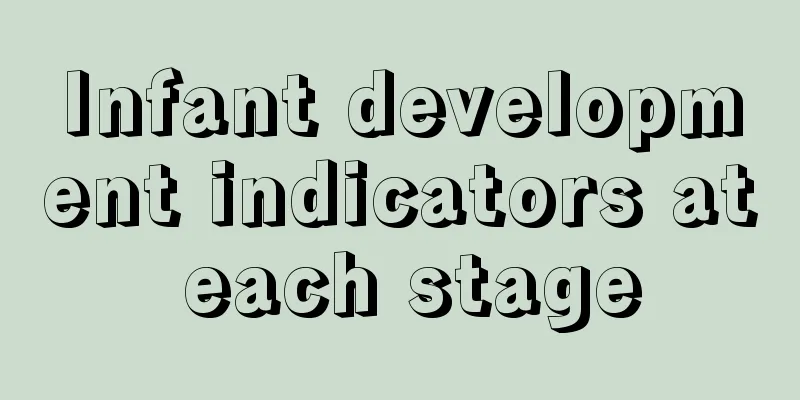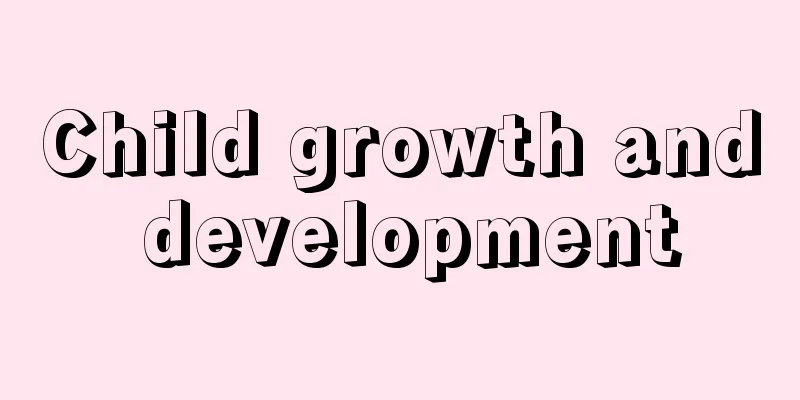Infant development indicators at each stage

|
Newborn babies are still relatively unfamiliar with the world and have not fully adapted to this environment, so parents need to take care of them patiently and learn some knowledge about the baby's development at each stage. Now let us learn about some developmental indicators of babies at each stage. The period from birth to 1 year old. 1 to 3 years old is the early childhood period. Some researchers call them the infancy period and the infant period respectively. The first stage is further divided into the neonatal period. The period from birth to one year old is the first accelerated period of an individual's physical and mental development. During this stage, not only does the baby's body grow rapidly and gain weight rapidly, but the brain and nervous system also develop rapidly. On this basis, the baby's psychology also undergoes tremendous changes under the influence of external environmental stimuli. They transitioned from breastfeeding to weaning, and learned the unique human way of eating; they developed from lying down and unable to move freely to being able to use their hands to touch and manipulate objects and stand on two legs, and learned to walk independently; they transitioned from not understanding language at all and not being able to speak to being able to use language for the simplest communication, etc. All this indicates that the baby has taken the first step from a natural, biological individual to a social entity. On the basis of their inherited biological nature, they form socialized human nature - sociality, and gradually adapt to human social life. During the period of 1 to 3 years old, infants' physical and mental development undergo two major changes: 1) They learn to walk independently and accurately play with or manipulate objects with their hands, and on this basis, they engage in the simplest games, learning, self-service and other activities. ② Language developed rapidly, and they were able to use language freely to communicate with others, and could make the most preliminary adjustments to their own behavior and psychological activities through language. This enables babies to adapt to social life better and produce new qualitative changes psychologically. ① The body weight can reach three times that at birth, which is about 9,000 to 10,000 grams. ② The height is about 50 cm at birth, and generally increases by 3 to 3.5 cm per month, 10 to 12 cm at 4 months, and can reach about 1.5 times the height at birth at 1 year old. ③The head circumference is about 34 cm at birth, increases by 8 to 10 cm in the first six months, and 2 to 4 cm in the second six months, reaching an average of 46 cm at one year old. The growth rate slows down afterwards, reaching about 56 to 58 cm in adults. ④ The chest circumference is 1 to 2 cm smaller than the head circumference at birth. By the end of 4 months, the chest circumference is basically the same as the head circumference. ⑤ The baby's brain is still in a period of rapid development for a period of time after birth, and the number of brain nerve cells continues to increase. It needs sufficient, balanced and reasonable support of nutrients (especially high-quality protein), so the demand for calories, protein and other nutrients is particularly strong. The above article has introduced in detail some developmental indicators of infants at different stages. I believe everyone has a relatively preliminary understanding. Therefore, in daily life, if such abnormal situations occur, parents should find the reasons in time. |
<<: The cause of white spots on baby's fingernails
>>: Reasons why a one-year-old baby sweats when sleeping
Recommend
Can babies drink honeysuckle tea?
Many people love to drink honeysuckle tea, especi...
How to lose weight when a child has a big belly? These methods are very effective
If a child has a big belly, it is mostly caused b...
What to do if your child's head circumference is too large
We all know that a baby's large head circumfe...
What are the causes of enuresis in children? This is the truth!
There are many reasons for enuresis in children. ...
What are the reasons why one-year-old babies cry at night?
Babies cannot express their emotions, nor can the...
Causes and treatment of small pimples on children's faces
Many children have small pimples on their faces, ...
How to make children not picky about food
Many times, when we parents buy food, we usually ...
What to do if your throat becomes red and swollen?
Discomfort in the throat will affect our voice an...
What is the best way to treat a child’s fever?
Mothers with children often encounter fever situa...
Eight-month-old baby's neck is a little crooked
Every baby should be fully examined before birth ...
What are the dangers of insufficient sleep in children?
Good sleep quality is a prerequisite for ensuring...
The child sneezes every morning
Sneezing is a common nasal symptom in people'...
Is it dangerous to get a vaccination when you have a fever?
There are many benefits of getting preventive sho...
How to treat school phobia?
It is the beginning of another school year. Many ...
What to prepare for a newborn baby
Newly born babies always make people worry. They ...









